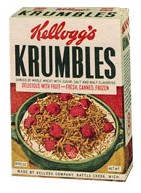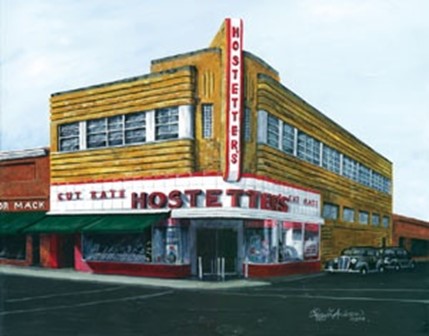Always a Learner
Susan and I sat at the table waiting for another friend to join us. As often happened in such times, our conversation turned to food—this time, the food of our childhood.
Talking about food reminded me of the old building smell and the unvarnished wooden floorboards of Mick or Mack, the first grocery store I remember. What filled the store’s shelves and freezers, I wondered. We had simple meals at home. How much of that was our limited budget, and how much was based on what was actually available in stores? Were there many frozen foods to choose from? What fresh fruits and vegetables did the store have?
We ate mostly what our garden produced, along with apples and peaches bought by the bushel at local orchards. We bought cabbage, iceberg lettuce, bananas, and oranges at the grocery store, but almost never grapes. I’m quite sure avocados, pineapples, fresh ginger, and leeks were not available. We bought Jello and Kellog’s corn flakes, Rice Krispies, Krumbles (no longer made), and puffed wheat in big plastic bags. What other processed or prepared foods were there? We ate Velveeta which was pretty much synonymous with cheese in my mind. The other cheese I knew was the cottage cheese Aunt Esther bought when she was dieting.



“I wish I could walk through that old Mick or Mack, just to see that was there,” I commented.
“We used to shop at Mick of Mack too,” Susan said.
“What I remember,” I continued, “is how fascinated I was by the way you could go in the store on one street and come out on another. Do you remember that? The building was an ell around the drugstore on the corner.”

My friend began talking about her drug store memories and I chimed in.
Our conversation went on, both of us reminiscing about the past. I’m not sure at what point I finally realized that instead of shared memories of the same grocery and drug stores, we were talking about completely different places. My friend was African American and we were talking about the segregated 1950s.
I was chagrinned by my blindness, my thoughtlessness, the privilege that allowed my blithe lack of awareness. In our growing up years the stores where my family shopped were off limits to her and her family. That hadn’t crossed my mind.
As a child, I accepted my White surroundings as normal—the way things were. I knew Black people lived in Harrisonburg. I had been to a Black church on a few occasions. I knew where they lived, the “Colored section of town,” but their absence in the stores where we shopped never crossed my mind.
Susan could not afford to be unaware. Her mother strictly forbade her and her siblings from going past a certain street. The only reason her mother crossed that boundary was because she worked as a maid for a White woman. Susan had never been in the Mick or Mack I remember nor in Hostetter’s Drug Store. Only when another Mick or Mack had been built farther south on the same street had she and I been in the same store, the one she remembered.
I can perhaps excuse my childhood lack of observation. Stores were not marked “Whites only.” No one was demonstrating outside the store. No one within my day-to-day life actively protested the hundreds of racist ordinances and laws that, because they didn’t apply to me, were invisible. I didn’t know the term Jim Crow. I didn’t know much about segregation—an ignorance born of privilege.
We were taught not to use the N-word, and that we should treat Black people with care and respect. But that teaching doesn’t go far when you don’t personally know Black people. We would never have sent a Black person to the back door or expected them to be less welcome than any other guest, but no Black people came. I didn’t wonder at that. I knew that “Colored Only” signs on restrooms and water fountains were wrong, but I rarely went to places where such signs were posted, so I rarely was confronted by them.
I can no longer plead ignorance. I was a teenager during the Civil Rights movement of the 60s. We listened to the news and saw pictures of the horrific violence that happened as people worked to end segregation. I have continued to learn about racism, about how hard-baked it is into all the systems of our country, starting with the arrival of White people on its shores. I have read books about racism, taken classes, done tours, visited multiple museums. Yet, here I was, caught up short once again with my own blindness when it came to the racism inherent in my own life.
Not long after our conversation my friend died and we never were able to talk about this conversation. I wanted to apologize to her, to acknowledge the discomfort or pain she must have felt at my lack of awareness. I wish I could ask her at what point she was aware that we were talking about different stores. Did she know it right away, or did it take her a moment to realize that we were speaking about different Mick or Mack stores, both on South Main Street? Was she just too polite to point out my mistaken assumptions? Did she feel hurt or have an eye-rolling moment of “here we go again” with White blindness?
All I can do now is silently thank her for her grace and for the friendship she offered in spite of my lack of awareness. I see more clearly than ever that no amount of learning will eradicate the racism with which I have lived all my life. Like stones brought to the surface of the ground by frosts, these blind spots will keep surfacing, offering me opportunities to expand my awareness.
I will remember Susan for her joy, her kindness, the conspiratorial sparkle in her eyes, but her greatest gift to me is nudging one more stone from the field of my unconscious, making it visible, and reminding me that I will always be a learner.
I can totally relate. I have learned so much about white privilege over the years…and to think back when Vangi and I would go to Harris Pool because it wasn’t as crowded as the Harrisonburg pool, never even thinking about the fact we could use their pool, while they weren’t allowed to use the other one. I started gaining more insight during my years in New York City, then 27 years working in Richmond, and I still continue to learn here in Portland, which has a terrible racist history. I am very grateful for the open relationships I have formed with quite a few black friends who have offered grace as I continue to learn and seek deeper understanding of the issue.
Thanks, Mary, I’d love to hear some of your stories. There is so much we didn’t let ourselves see, in the past, and even now. It is a life-long challenge.
What a very meaningful reflection on how pervasive racism can be, and how unwittingly we can all be a part of it. I remember how surprised and dismayed I was when learning how a Jamaican friend recounted how, when looking for an apartment, she was told one was available – and then when she arrived to accept it, was told it was no longer available. A very minor example, perhaps, but it made me aware of how hurtful it can be.
Thanks Kathie, for your enlightening story, and one that can make us think about how readily we can be implicated in this injustice.
Yes, I’m sure not getting an apartment feels pretty major when it happens and probably not only once, but multiple times. If only such things were only in the past, but they still happen.
Penetrating and profound!
Thanks, Donna. What I wrote feels disconcerting and dismaying–the lack of awareness that I have about my own privilege. That was not a word we would have associated with Mennonite selves in my growing up years. We thought we were the other, not recognizing how Whiteness made us part of the dominant culture, how that defined us even more than plain clothing.
I like your title so much. In G.M Hopkin’s words:
We think by feeling,
what is there to know?
We learn by going where
We have to go.